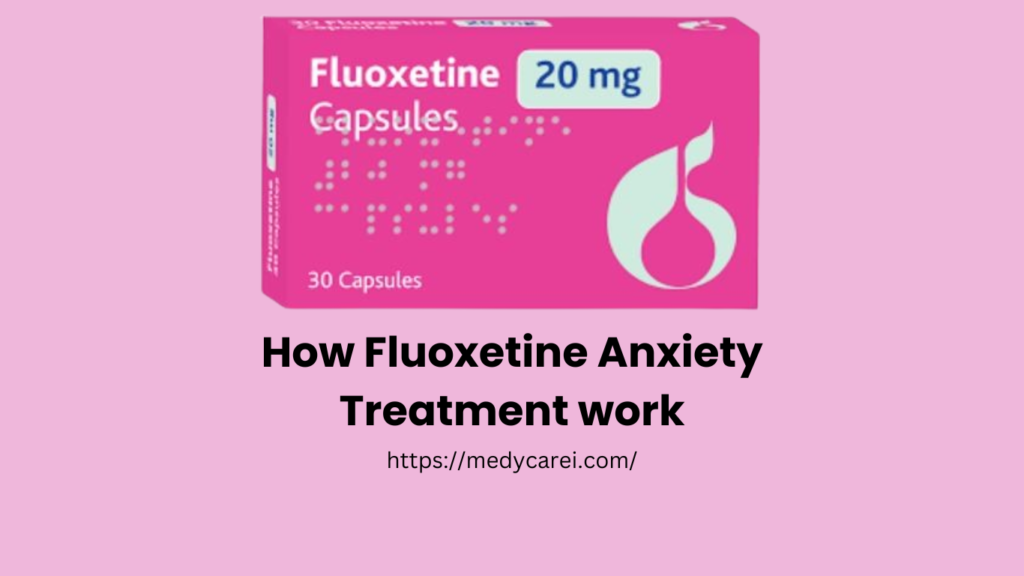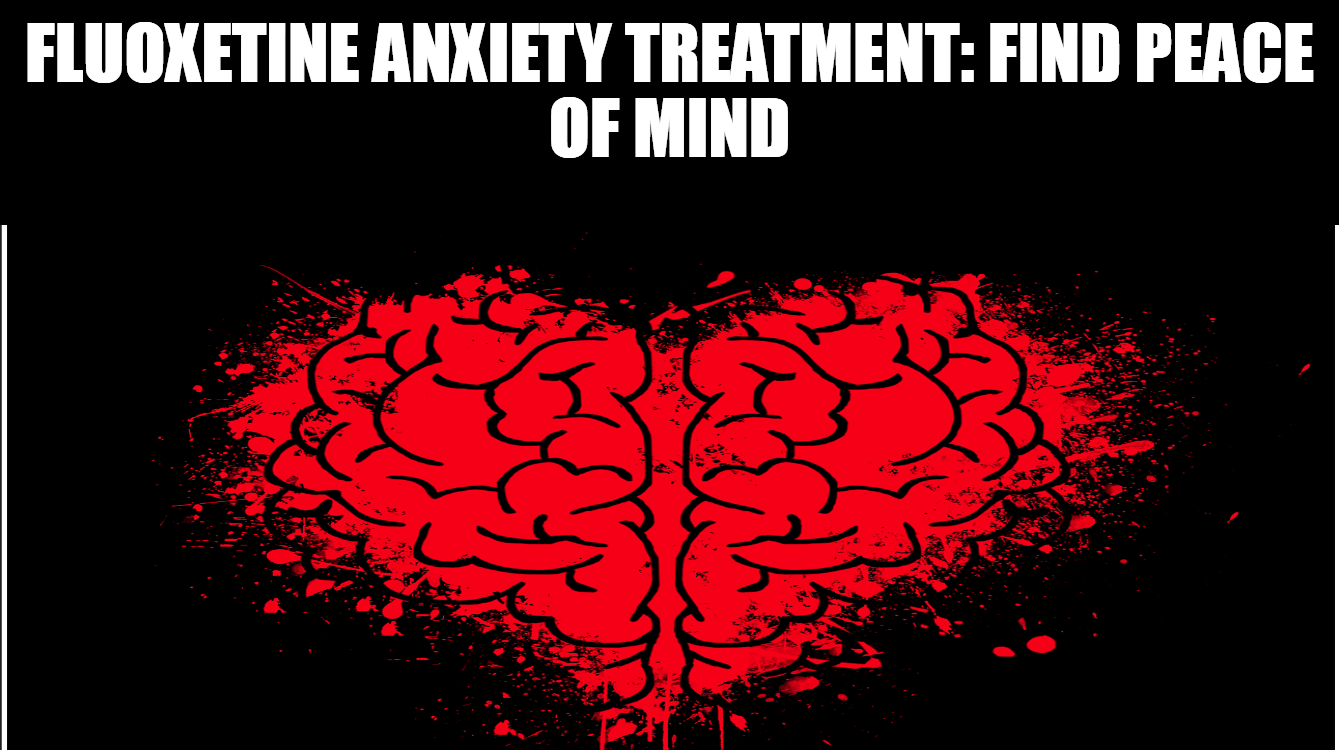Introduction
Looking for effective Fluoxetine anxiety treatment options? It’s so much more than the passing concern or fear—it’s an issue that so many people wrestle with. It’s something most have to do battle against daily, and it gets in the way of living life completely. This is where medications like Fluoxetine come in. Known far and wide by its brand name, Prozac, Fluoxetine has been making itself known for a number of years for its ability to help people battle several different types of anxiety disorders. What exactly does this medication do? How effective is this therapy, and what should a person know before considering it as a treatment option?
Understanding Anxiety Disorders
One of the most frequent forms of mental illness are anxiety disorders, which afflict millions around the world. The forms they take include Generalized Anxiety Disorder (GAD), Social Anxiety Disorder (SAD), Panic Disorder, and Obsessive-Compulsive Disorder (OCD). Symptoms within each form of anxiety disorder differ, although characteristics in them usually include excessive worrying, restlessness, fatigue, and difficulty concentrating. Characteristics might be so disruptive in life that even the simplest routines may seem unbearable.
What is Fluoxetine?
Fluoxetine is one of the members of Selective Serotonin Reuptake Inhibitors (SSRIs), among the many types of antidepressants. This was first discovered in the 1970s by Eli Lilly and Company, later to be approved by the FDA in 1987. Since its discovery, it’s been widely in use, not only in cases of depression but various other anxiety disorders. It works by increasing serotonin, a neurotransmitter present in the brain involved with moods, anxiety, and elation.
How Fluoxetine Anxiety Treatment work

One of the most common causes associated with anxiety disorders, and particularly generalized anxiety disorder, is believed to be the imbalance of chemicals inside the brain—a condition related to serotonin. Serotonin is the most important neurotransmitter in the brain. Fluoxetine prevents this neurotransmitter from being reabsorbed to increase the total amount remaining inside the brain. The consequence is simply to have more serotonin available in the brain. This reduces mood instability and lowers general levels of anxiety. Unlike some other medications, Fluoxetine has some of the mildest side effects and also works effectively on numerous disorders related to anxiety.
Dosage and Administration
Dosage of Fluoxetine might be adapted depending on the patient and his state of anxiety. Generally, a physician starts out by prescribing a low dose of 10-20mg per day, and if need be, the dose is increased due to the patient’s response and tolerance. It is very important to follow your health care provider’s instructions exactly without adjusting your dose on your own. The dosage may, in time, be titrated due to side effects or if the initial dosage is not effective.
Effectiveness of Fluoxetine for Anxiety
Fluoxetine has been researched rather well into its effectiveness in the treatment of anxiety. It has been established that it can bring about remission in anxiety symptoms for most disorders; more importantly, when administered over a long duration of time. Very many patients notice a dramatic improvement in their capacity to cope with daily stress and anxiety, while for some, a complete remission of symptoms results. But again, like every medication, this effectiveness may differ from one individual to another.
Side Effects and Risks
While Fluoxetine is generally well-tolerated, side effects can result. The most commonly experienced side effects are nausea, headaches, dizziness, dry mouth, and changes in sleep. Most of these side effects are mild and tend to diminish as your body adjusts to the medication. Still, severe adverse effects have been found, like an increased risk of suicidal thoughts, especially in young adults and adolescents. These risks need to be looked out for, and medical advice sought in case of worrying symptoms.
Fluoxetine for Specific Anxiety Disorders
Fluoxetine is a versatile medication and has been applied effectively in the management of various anxiety disorders:
- Generalized Anxiety Disorder (GAD): Fluoxetine will help lessen the chronic excessive worrying connected with GAD.
- Social Anxiety Disorder (SAD): It alleviates the intense fear and avoidance of social situations.
- Panic Disorder: Fluoxetine reduces the frequency of and severity of panic attacks.
- Obsessive-Compulsive Disorder (OCD): In this condition, the drug is effective in attenuating the compulsions and obsessional thinking.
Interactions with Other Medications
Fluoxetine interacts with quite a number of other drugs, which may tend to either decrease its effect or escalate the possibility of side effects. Common interactions include other SSRIs, blood thinners, and some pain medicines. It is also important to consider the interaction of over-the-counter drugs and supplements. All these should be made clear to your health provider so that they can avoid the potentiality of such interactions.
Who Should Not Take Fluoxetine?
Fluoxetine is not meant for every person. The drug should be avoided by a person diagnosed with bipolar disorder, with a history of seizures, or problems with their liver. In addition, it is not recommended that anybody who is pregnant or breastfeeding take the drug, unless the benefits far exceed the likely risks. Worthy to note is the drug’s possible effect on older individuals—considering them more sensitive to its side effects—and a number of specific warnings to children and adolescents against its use.
Starting Fluoxetine: What to Expect
Remember that it will often take several weeks before the full effects of Fluoxetine are apparent. Some people may notice an initial unwanted effect, such as disturbed sleep or nausea, but these are usually short-lived and not a reason to stop treatment. A check-up with your doctor will be necessary to review progress and any changes that might have to be made to the dose.
Tips for Maximizing the Benefits of Fluoxetine
Being healthy should also help ensure the most out of Fluoxetine: good exercise, healthy diet, and good sleep hygiene. Further, when one is interested in a more comprehensive treatment regimen for anxiety, it is much better to combine Fluoxetine with psychotherapy or counseling. The trick is in taking the medication at the same time every day and as per the doctor’s instructions.
Alternative Treatments for Anxiety
Fluoxetine works for many people, but it is not the only medicine that can help. If Fluoxetine isn’t the right fit, there are others within the SSRIs class, including Sertraline (Zoloft) and Citalopram (Celexa). Some non-pharmacologic treatments that appear useful in some patients—likely when combined with one of the medications mentioned above—include those that incorporate cognitive behavioral therapy, mindfulness, and lifestyle. Therefore, the best way to weigh the pros and cons of each approach would be speaking to a healthcare provider with regard to a treatment plan.
Myths and Misconceptions about Fluoxetine
Even with its vast usage, a lot of myths run around Fluoxetine. For example, some people think that it is an addictive medication or that their personality will be changed. Others are simply apprehensive about being medicated for a longer time. It is good to make it clear that Fluoxetine is not an addiction. The drug may have side effects but does not change your personality; it is simply an aid to help one control anxiety. It is not an all-gone, do-all pill to fix you up fast.
Related Topic : Understanding Sertraline 50mg Benefits for a Happier Life
Conclusion
Fluoxetine has proven to be effective in treating disorders associated with anxiety. It helps maintain an even mood and lessen anxiety, hence giving many a chance to lead a much more balanced and less stressful life. Yet, such is the case with any medication, and as a result, it is not without complications.
Disclaimer
The information provided on this blog regarding medicine prices and side effects is solely based on data collected from public domains. I am not a doctor or medical professional. While I strive to provide accurate and up-to-date information, I cannot guarantee the absolute accuracy or completeness of the data. It is always recommended to consult with a qualified healthcare professional or doctor for personalized medical advice and information. The content on this blog should not assume any responsibility for any consequences arising from the use of the information on this blog.
Thank you.
